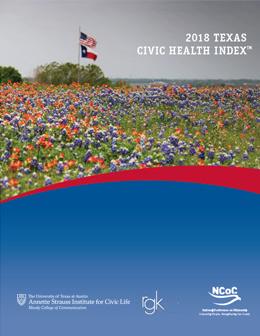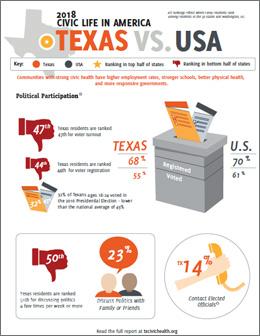Texas Civic Health
As early voting is set to begin in the Texas primaries, new data from The University of Texas at Austin finds that Texas continues to have one of the nation’s lowest rates of political and civic participation.
The report — completed by UT Austin’s Annette Strauss Institute for Civic Life, the National Conference on Citizenship and the RGK Center for Philanthropy and Community Service — is an update to the Texas Civic Health Index, a nonpartisan, comprehensive evaluation of community and political engagement throughout the state.
“This report highlights the compelling need to work together to support civic engagement across Texas to strengthen our communities and increase citizen involvement in public life,” saidSusan Nold, director of the Annette Strauss Institute for Civic Life and senior lecturer of communication studies. “Due in part to our size and in part to our growth, Texas continues to fall behind the bulk of the nation when it comes to measures such as voting and civic involvement.”
Among the findings from the report, which ranks the 50 states and the District of Columbia:
- Political participation remains extremely low. In 2016, Texas ranked 47th in voter turnout and 44th in voter registration.
- A dislike of candidates and the issues are the reason Texans didn’t vote in 2016. In contrast, the No. 1 reason given for not voting in 2012 was “too busy” or had a “conflict with work,” with dislike of the candidates and issues ranking a distant third.
- Texans do not regularly talk about politics. When asked how frequently they talk about politics with friends and family, only 23 percent say they do so often, ranking the state 50th in the nation.
- Donating and volunteering isn’t a priority for many Texans. Rates of civic involvement are also relatively low, with Texas ranking 40th in donating and 39th in volunteering. Age and education correlate with civic involvement, with those having a college degree highly associating with group involvement.
- Texans make relatively good neighbors. Texas ranks 24th in the number of people who help their neighbors by exchanging favors a few times a week or more, and this neighborliness is higher among those in lower socioeconomic brackets. However, Texas ranks 45th in terms of neighborhood trust.
Higher levels of education correlate with higher levels of almost every measure of political participation and civic involvement analyzed in the Civic Health Index.
“This report sheds light on the necessity of teaching and practicing civic engagement in Texas, and not all of it is bad news,” Nold said. “On several measures, Texas is keeping up with our growth. Our goal in publishing this report is to keep this important conversation on the minds of all Texans and to recognize that small, simple actions taken by each of us — such as voting and doing a favor for a neighbor — contribute to stronger, more vibrant communities across Texas.”
The data was obtained from a few sources including the U.S. Census Bureau Current Population Survey on Voting, Volunteering and Civic Engagement from 2013 to 2017, and from the 2017 Texas Media and Society Survey conducted by the Annette Strauss Institute.
The report also includes suggestions for improving the state’s civic participation. Among the recommendations are improving civic literacy through schools, studying successful civic engagement approaches in other states, increasing access to education that builds skills around civic leadership, increasing innovation through new technology, and supporting organizations such as neighborhood associations, local nonprofits and community centers.
To read the full report, visit txcivichealth.org.

The report was produced in collaboration with
Leadership Austin, the Austin Community Foundation, KLRU-TV and KUT Radio.


